The Influence of English Language on Mathematics Performance
VerifiedAdded on 2020/06/04
|6
|1696
|479
Report
AI Summary
This report examines the influence of the English language on mathematics performance within TVET Colleges, particularly in the context of South Africa. It explores the challenges faced by students who are learning mathematics through English, often as a second language. The report reviews relevant literature, discussing the correlation between English language proficiency and mathematical achievement. It highlights the differences in performance between native English speakers and those who use English as a second language, referencing studies on language acquisition, bilingualism, and the impact of language on problem-solving abilities. The conclusion emphasizes the significance of English language skills in mathematics education and the need for educators to address the language-related challenges faced by students. The report also provides a comprehensive overview of the impact of language on mathematical understanding and performance, drawing upon various research studies and expert opinions.
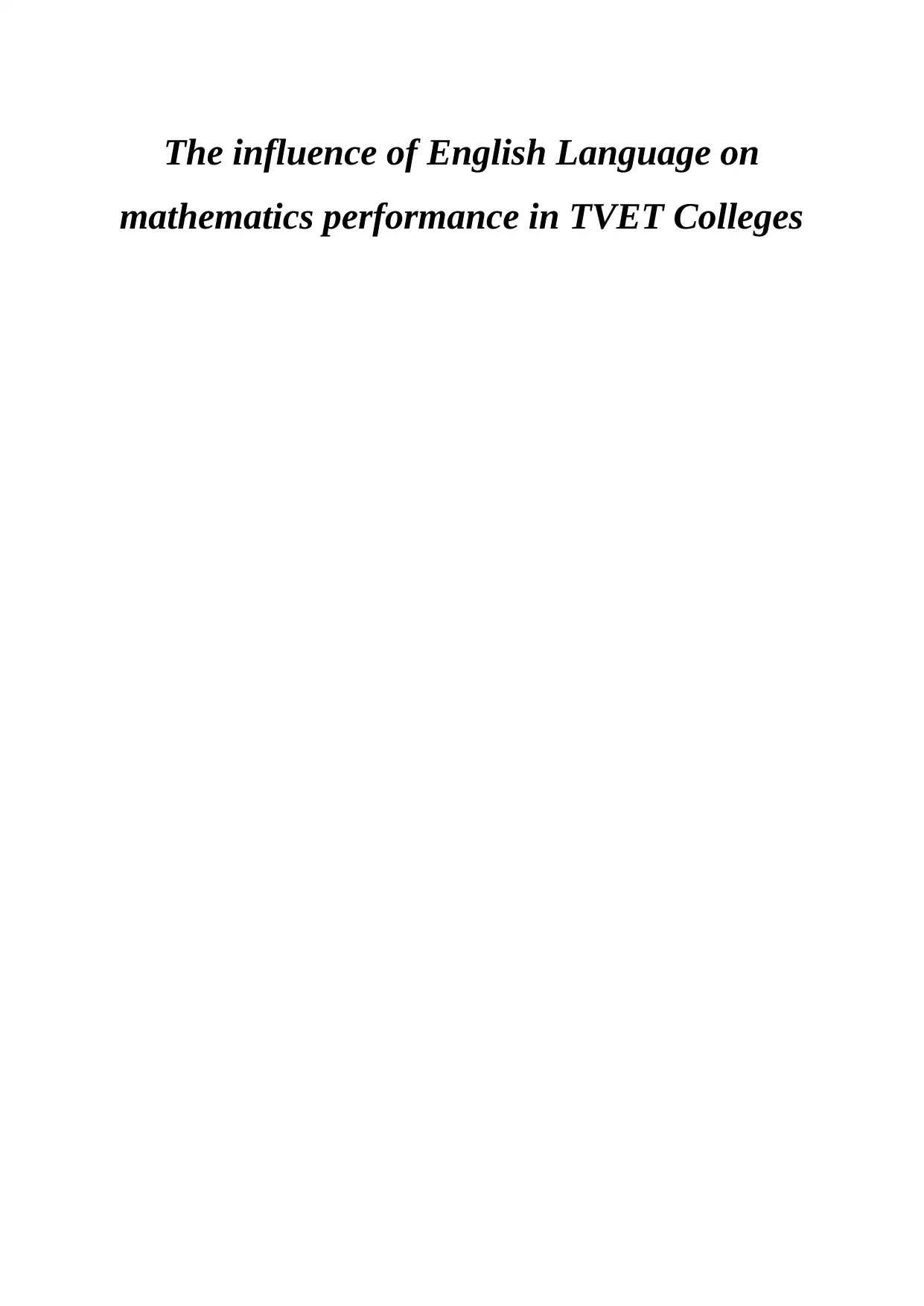
The influence of English Language on
mathematics performance in TVET Colleges
mathematics performance in TVET Colleges
Paraphrase This Document
Need a fresh take? Get an instant paraphrase of this document with our AI Paraphraser

TABLE OF CONTENTS
INTRODUCTION......................................................................................................................3
LITERATURE REVIEW...........................................................................................................3
CONCLUSION..........................................................................................................................5
REFERENCES...........................................................................................................................1
INTRODUCTION......................................................................................................................3
LITERATURE REVIEW...........................................................................................................3
CONCLUSION..........................................................................................................................5
REFERENCES...........................................................................................................................1
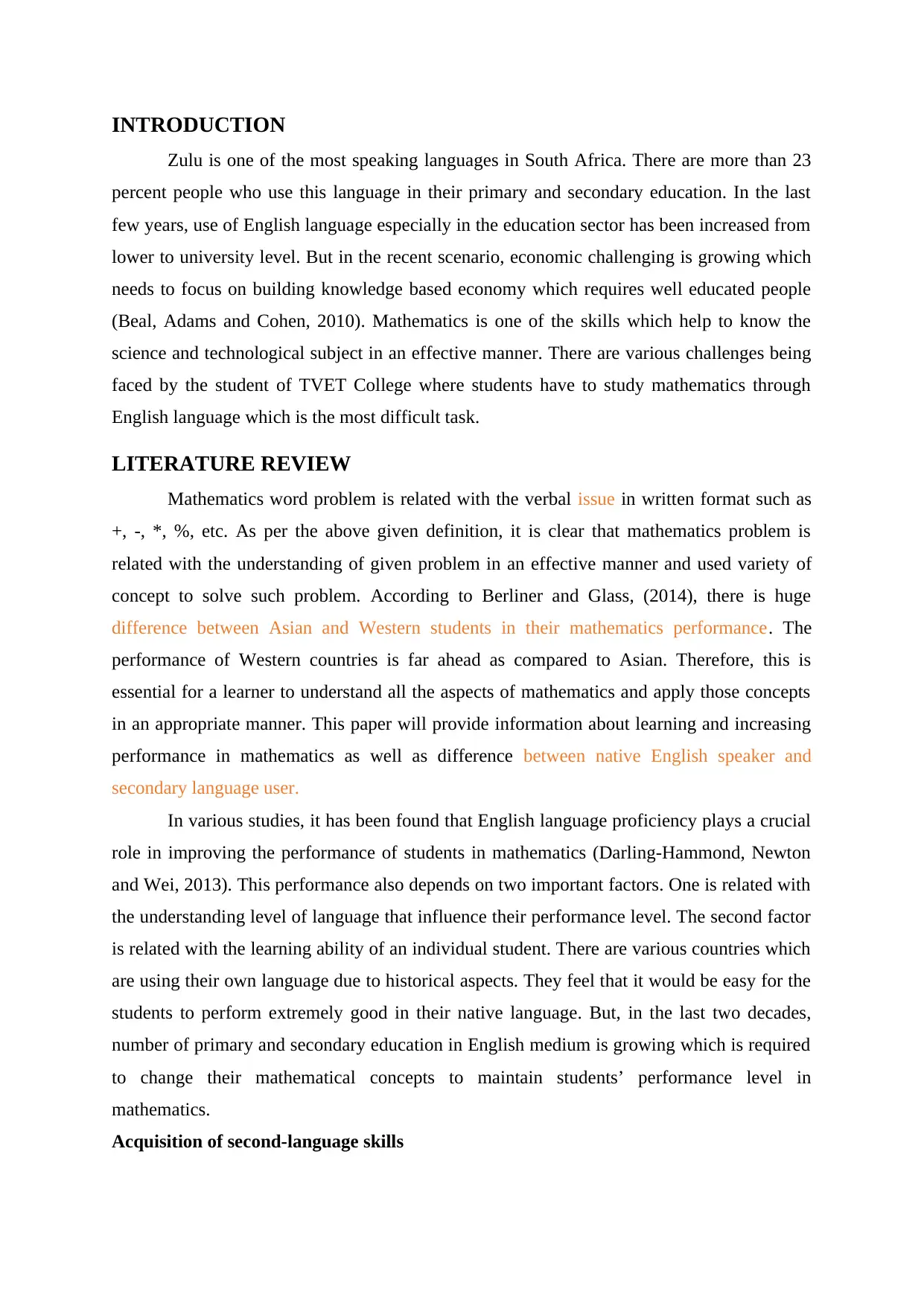
INTRODUCTION
Zulu is one of the most speaking languages in South Africa. There are more than 23
percent people who use this language in their primary and secondary education. In the last
few years, use of English language especially in the education sector has been increased from
lower to university level. But in the recent scenario, economic challenging is growing which
needs to focus on building knowledge based economy which requires well educated people
(Beal, Adams and Cohen, 2010). Mathematics is one of the skills which help to know the
science and technological subject in an effective manner. There are various challenges being
faced by the student of TVET College where students have to study mathematics through
English language which is the most difficult task.
LITERATURE REVIEW
Mathematics word problem is related with the verbal issue in written format such as
+, -, *, %, etc. As per the above given definition, it is clear that mathematics problem is
related with the understanding of given problem in an effective manner and used variety of
concept to solve such problem. According to Berliner and Glass, (2014), there is huge
difference between Asian and Western students in their mathematics performance. The
performance of Western countries is far ahead as compared to Asian. Therefore, this is
essential for a learner to understand all the aspects of mathematics and apply those concepts
in an appropriate manner. This paper will provide information about learning and increasing
performance in mathematics as well as difference between native English speaker and
secondary language user.
In various studies, it has been found that English language proficiency plays a crucial
role in improving the performance of students in mathematics (Darling-Hammond, Newton
and Wei, 2013). This performance also depends on two important factors. One is related with
the understanding level of language that influence their performance level. The second factor
is related with the learning ability of an individual student. There are various countries which
are using their own language due to historical aspects. They feel that it would be easy for the
students to perform extremely good in their native language. But, in the last two decades,
number of primary and secondary education in English medium is growing which is required
to change their mathematical concepts to maintain students’ performance level in
mathematics.
Acquisition of second-language skills
Zulu is one of the most speaking languages in South Africa. There are more than 23
percent people who use this language in their primary and secondary education. In the last
few years, use of English language especially in the education sector has been increased from
lower to university level. But in the recent scenario, economic challenging is growing which
needs to focus on building knowledge based economy which requires well educated people
(Beal, Adams and Cohen, 2010). Mathematics is one of the skills which help to know the
science and technological subject in an effective manner. There are various challenges being
faced by the student of TVET College where students have to study mathematics through
English language which is the most difficult task.
LITERATURE REVIEW
Mathematics word problem is related with the verbal issue in written format such as
+, -, *, %, etc. As per the above given definition, it is clear that mathematics problem is
related with the understanding of given problem in an effective manner and used variety of
concept to solve such problem. According to Berliner and Glass, (2014), there is huge
difference between Asian and Western students in their mathematics performance. The
performance of Western countries is far ahead as compared to Asian. Therefore, this is
essential for a learner to understand all the aspects of mathematics and apply those concepts
in an appropriate manner. This paper will provide information about learning and increasing
performance in mathematics as well as difference between native English speaker and
secondary language user.
In various studies, it has been found that English language proficiency plays a crucial
role in improving the performance of students in mathematics (Darling-Hammond, Newton
and Wei, 2013). This performance also depends on two important factors. One is related with
the understanding level of language that influence their performance level. The second factor
is related with the learning ability of an individual student. There are various countries which
are using their own language due to historical aspects. They feel that it would be easy for the
students to perform extremely good in their native language. But, in the last two decades,
number of primary and secondary education in English medium is growing which is required
to change their mathematical concepts to maintain students’ performance level in
mathematics.
Acquisition of second-language skills
⊘ This is a preview!⊘
Do you want full access?
Subscribe today to unlock all pages.

Trusted by 1+ million students worldwide
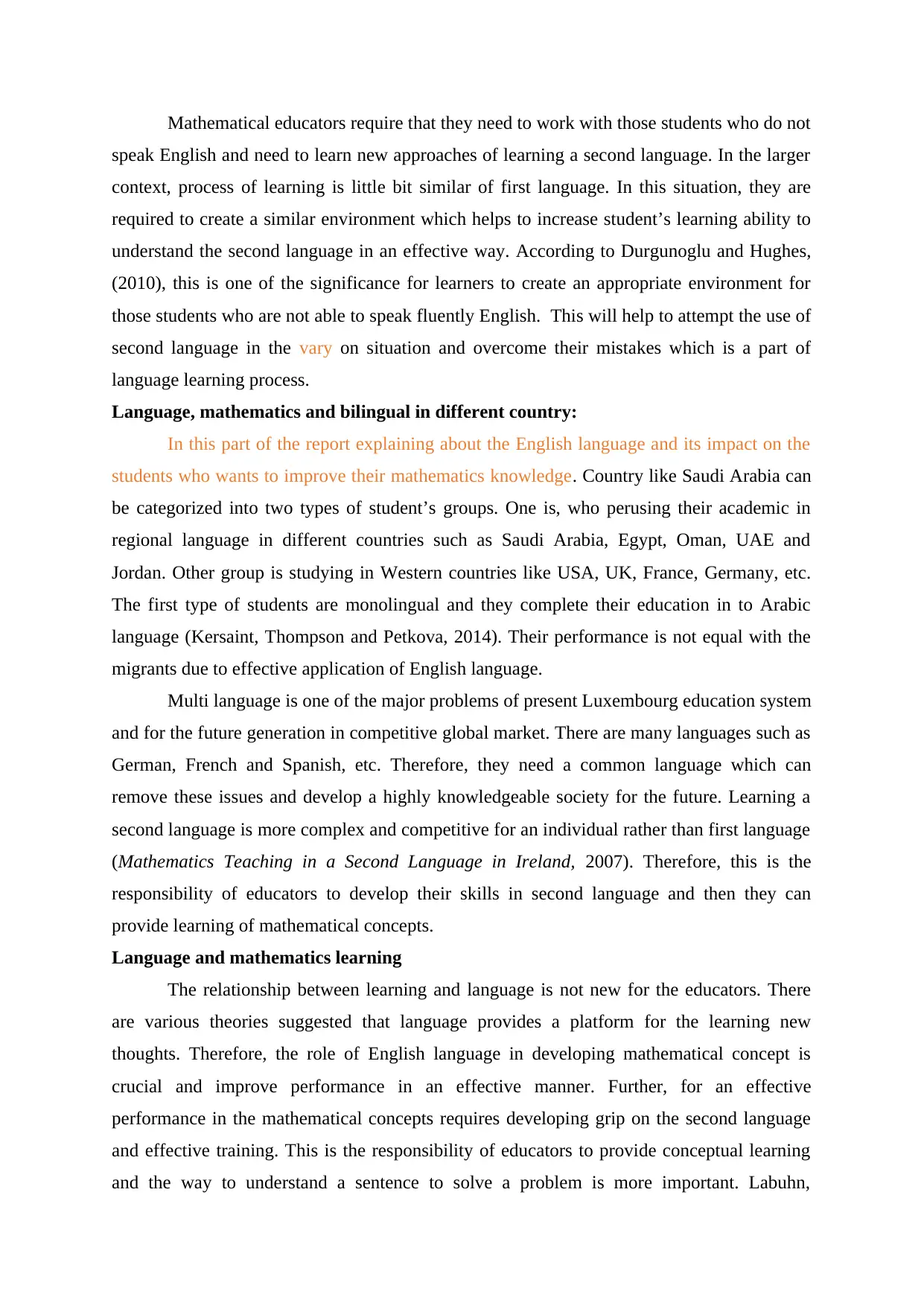
Mathematical educators require that they need to work with those students who do not
speak English and need to learn new approaches of learning a second language. In the larger
context, process of learning is little bit similar of first language. In this situation, they are
required to create a similar environment which helps to increase student’s learning ability to
understand the second language in an effective way. According to Durgunoglu and Hughes,
(2010), this is one of the significance for learners to create an appropriate environment for
those students who are not able to speak fluently English. This will help to attempt the use of
second language in the vary on situation and overcome their mistakes which is a part of
language learning process.
Language, mathematics and bilingual in different country:
In this part of the report explaining about the English language and its impact on the
students who wants to improve their mathematics knowledge. Country like Saudi Arabia can
be categorized into two types of student’s groups. One is, who perusing their academic in
regional language in different countries such as Saudi Arabia, Egypt, Oman, UAE and
Jordan. Other group is studying in Western countries like USA, UK, France, Germany, etc.
The first type of students are monolingual and they complete their education in to Arabic
language (Kersaint, Thompson and Petkova, 2014). Their performance is not equal with the
migrants due to effective application of English language.
Multi language is one of the major problems of present Luxembourg education system
and for the future generation in competitive global market. There are many languages such as
German, French and Spanish, etc. Therefore, they need a common language which can
remove these issues and develop a highly knowledgeable society for the future. Learning a
second language is more complex and competitive for an individual rather than first language
(Mathematics Teaching in a Second Language in Ireland, 2007). Therefore, this is the
responsibility of educators to develop their skills in second language and then they can
provide learning of mathematical concepts.
Language and mathematics learning
The relationship between learning and language is not new for the educators. There
are various theories suggested that language provides a platform for the learning new
thoughts. Therefore, the role of English language in developing mathematical concept is
crucial and improve performance in an effective manner. Further, for an effective
performance in the mathematical concepts requires developing grip on the second language
and effective training. This is the responsibility of educators to provide conceptual learning
and the way to understand a sentence to solve a problem is more important. Labuhn,
speak English and need to learn new approaches of learning a second language. In the larger
context, process of learning is little bit similar of first language. In this situation, they are
required to create a similar environment which helps to increase student’s learning ability to
understand the second language in an effective way. According to Durgunoglu and Hughes,
(2010), this is one of the significance for learners to create an appropriate environment for
those students who are not able to speak fluently English. This will help to attempt the use of
second language in the vary on situation and overcome their mistakes which is a part of
language learning process.
Language, mathematics and bilingual in different country:
In this part of the report explaining about the English language and its impact on the
students who wants to improve their mathematics knowledge. Country like Saudi Arabia can
be categorized into two types of student’s groups. One is, who perusing their academic in
regional language in different countries such as Saudi Arabia, Egypt, Oman, UAE and
Jordan. Other group is studying in Western countries like USA, UK, France, Germany, etc.
The first type of students are monolingual and they complete their education in to Arabic
language (Kersaint, Thompson and Petkova, 2014). Their performance is not equal with the
migrants due to effective application of English language.
Multi language is one of the major problems of present Luxembourg education system
and for the future generation in competitive global market. There are many languages such as
German, French and Spanish, etc. Therefore, they need a common language which can
remove these issues and develop a highly knowledgeable society for the future. Learning a
second language is more complex and competitive for an individual rather than first language
(Mathematics Teaching in a Second Language in Ireland, 2007). Therefore, this is the
responsibility of educators to develop their skills in second language and then they can
provide learning of mathematical concepts.
Language and mathematics learning
The relationship between learning and language is not new for the educators. There
are various theories suggested that language provides a platform for the learning new
thoughts. Therefore, the role of English language in developing mathematical concept is
crucial and improve performance in an effective manner. Further, for an effective
performance in the mathematical concepts requires developing grip on the second language
and effective training. This is the responsibility of educators to provide conceptual learning
and the way to understand a sentence to solve a problem is more important. Labuhn,
Paraphrase This Document
Need a fresh take? Get an instant paraphrase of this document with our AI Paraphraser
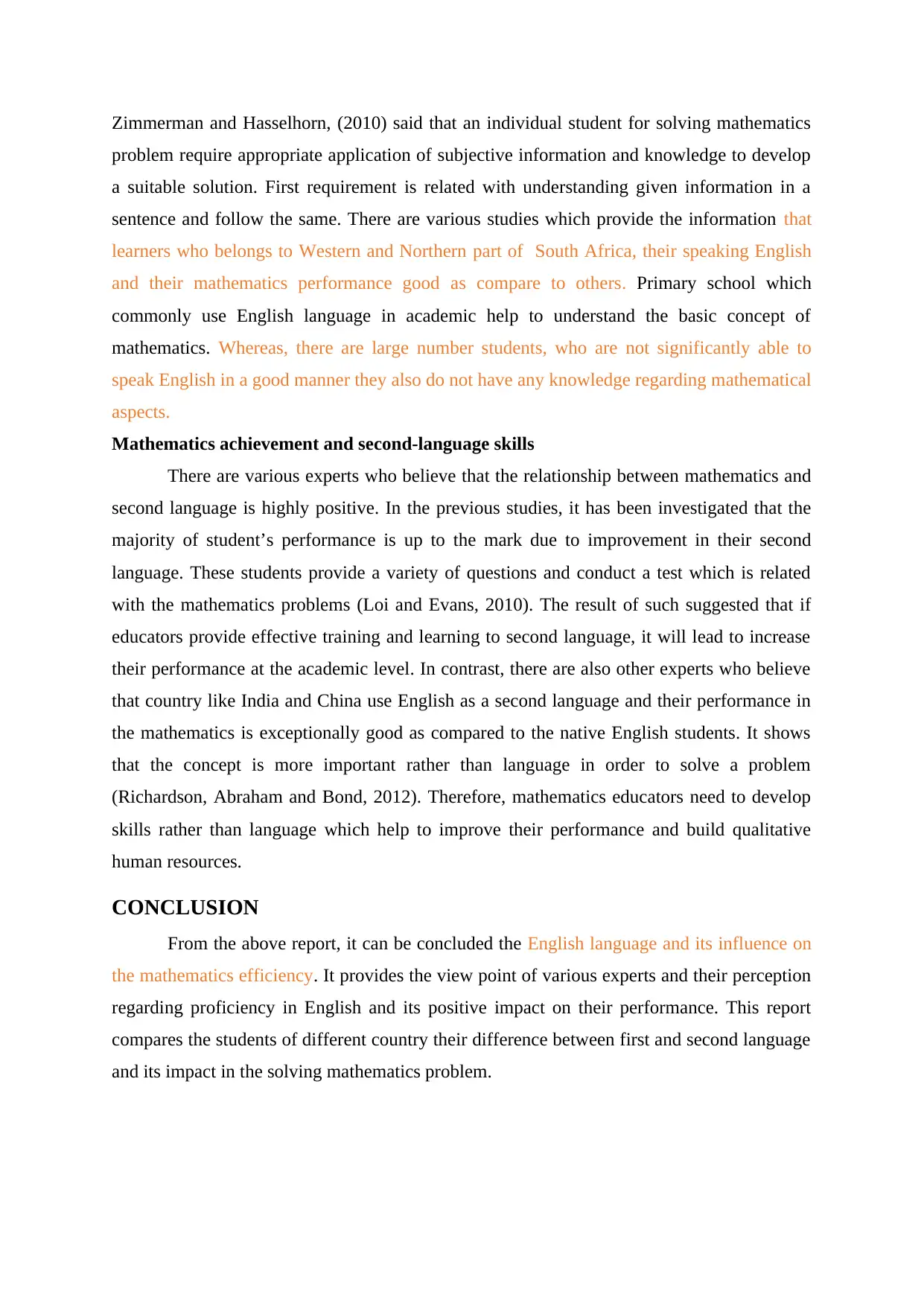
Zimmerman and Hasselhorn, (2010) said that an individual student for solving mathematics
problem require appropriate application of subjective information and knowledge to develop
a suitable solution. First requirement is related with understanding given information in a
sentence and follow the same. There are various studies which provide the information that
learners who belongs to Western and Northern part of South Africa, their speaking English
and their mathematics performance good as compare to others. Primary school which
commonly use English language in academic help to understand the basic concept of
mathematics. Whereas, there are large number students, who are not significantly able to
speak English in a good manner they also do not have any knowledge regarding mathematical
aspects.
Mathematics achievement and second-language skills
There are various experts who believe that the relationship between mathematics and
second language is highly positive. In the previous studies, it has been investigated that the
majority of student’s performance is up to the mark due to improvement in their second
language. These students provide a variety of questions and conduct a test which is related
with the mathematics problems (Loi and Evans, 2010). The result of such suggested that if
educators provide effective training and learning to second language, it will lead to increase
their performance at the academic level. In contrast, there are also other experts who believe
that country like India and China use English as a second language and their performance in
the mathematics is exceptionally good as compared to the native English students. It shows
that the concept is more important rather than language in order to solve a problem
(Richardson, Abraham and Bond, 2012). Therefore, mathematics educators need to develop
skills rather than language which help to improve their performance and build qualitative
human resources.
CONCLUSION
From the above report, it can be concluded the English language and its influence on
the mathematics efficiency. It provides the view point of various experts and their perception
regarding proficiency in English and its positive impact on their performance. This report
compares the students of different country their difference between first and second language
and its impact in the solving mathematics problem.
problem require appropriate application of subjective information and knowledge to develop
a suitable solution. First requirement is related with understanding given information in a
sentence and follow the same. There are various studies which provide the information that
learners who belongs to Western and Northern part of South Africa, their speaking English
and their mathematics performance good as compare to others. Primary school which
commonly use English language in academic help to understand the basic concept of
mathematics. Whereas, there are large number students, who are not significantly able to
speak English in a good manner they also do not have any knowledge regarding mathematical
aspects.
Mathematics achievement and second-language skills
There are various experts who believe that the relationship between mathematics and
second language is highly positive. In the previous studies, it has been investigated that the
majority of student’s performance is up to the mark due to improvement in their second
language. These students provide a variety of questions and conduct a test which is related
with the mathematics problems (Loi and Evans, 2010). The result of such suggested that if
educators provide effective training and learning to second language, it will lead to increase
their performance at the academic level. In contrast, there are also other experts who believe
that country like India and China use English as a second language and their performance in
the mathematics is exceptionally good as compared to the native English students. It shows
that the concept is more important rather than language in order to solve a problem
(Richardson, Abraham and Bond, 2012). Therefore, mathematics educators need to develop
skills rather than language which help to improve their performance and build qualitative
human resources.
CONCLUSION
From the above report, it can be concluded the English language and its influence on
the mathematics efficiency. It provides the view point of various experts and their perception
regarding proficiency in English and its positive impact on their performance. This report
compares the students of different country their difference between first and second language
and its impact in the solving mathematics problem.
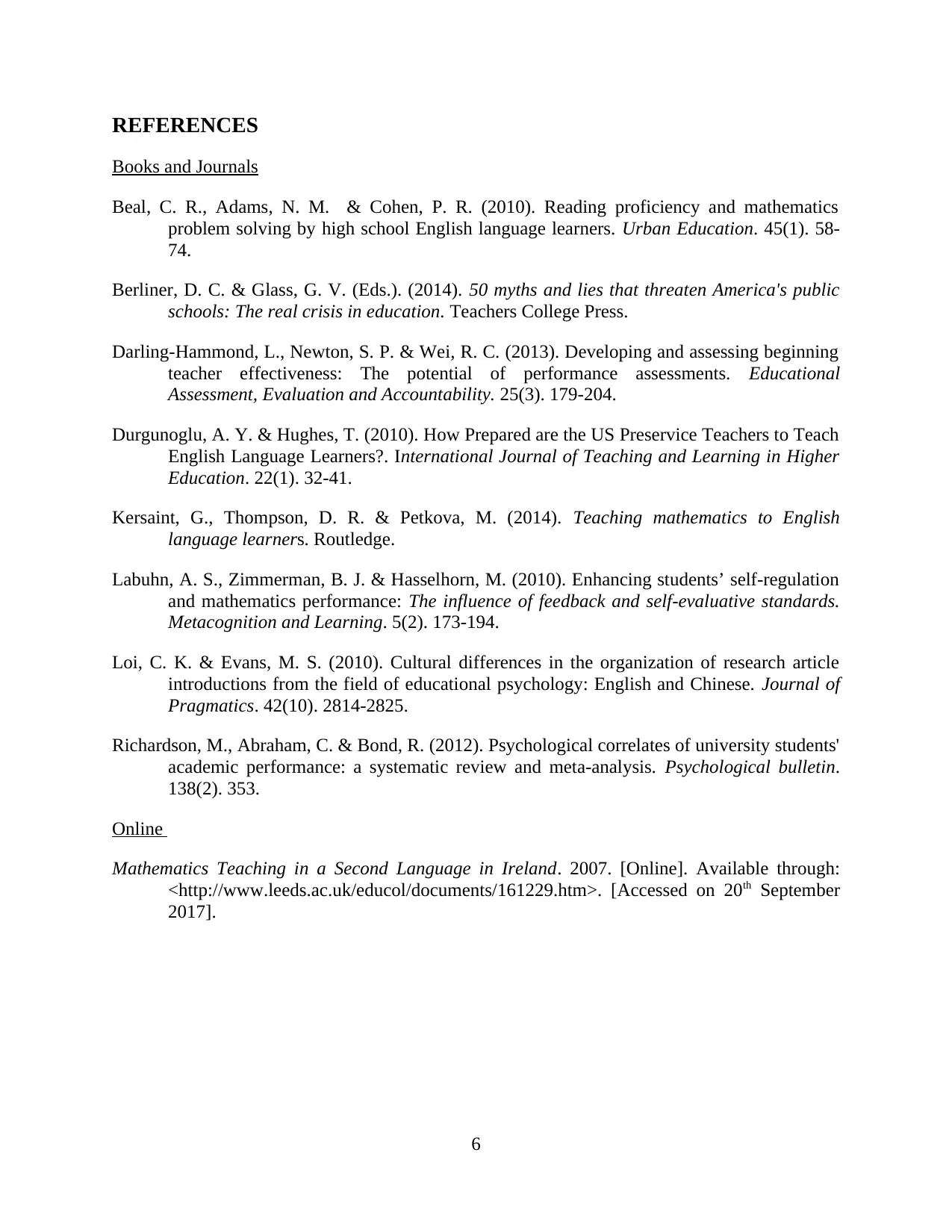
REFERENCES
Books and Journals
Beal, C. R., Adams, N. M. & Cohen, P. R. (2010). Reading proficiency and mathematics
problem solving by high school English language learners. Urban Education. 45(1). 58-
74.
Berliner, D. C. & Glass, G. V. (Eds.). (2014). 50 myths and lies that threaten America's public
schools: The real crisis in education. Teachers College Press.
Darling-Hammond, L., Newton, S. P. & Wei, R. C. (2013). Developing and assessing beginning
teacher effectiveness: The potential of performance assessments. Educational
Assessment, Evaluation and Accountability. 25(3). 179-204.
Durgunoglu, A. Y. & Hughes, T. (2010). How Prepared are the US Preservice Teachers to Teach
English Language Learners?. International Journal of Teaching and Learning in Higher
Education. 22(1). 32-41.
Kersaint, G., Thompson, D. R. & Petkova, M. (2014). Teaching mathematics to English
language learners. Routledge.
Labuhn, A. S., Zimmerman, B. J. & Hasselhorn, M. (2010). Enhancing students’ self-regulation
and mathematics performance: The influence of feedback and self-evaluative standards.
Metacognition and Learning. 5(2). 173-194.
Loi, C. K. & Evans, M. S. (2010). Cultural differences in the organization of research article
introductions from the field of educational psychology: English and Chinese. Journal of
Pragmatics. 42(10). 2814-2825.
Richardson, M., Abraham, C. & Bond, R. (2012). Psychological correlates of university students'
academic performance: a systematic review and meta-analysis. Psychological bulletin.
138(2). 353.
Online
Mathematics Teaching in a Second Language in Ireland. 2007. [Online]. Available through:
<http://www.leeds.ac.uk/educol/documents/161229.htm>. [Accessed on 20th September
2017].
6
Books and Journals
Beal, C. R., Adams, N. M. & Cohen, P. R. (2010). Reading proficiency and mathematics
problem solving by high school English language learners. Urban Education. 45(1). 58-
74.
Berliner, D. C. & Glass, G. V. (Eds.). (2014). 50 myths and lies that threaten America's public
schools: The real crisis in education. Teachers College Press.
Darling-Hammond, L., Newton, S. P. & Wei, R. C. (2013). Developing and assessing beginning
teacher effectiveness: The potential of performance assessments. Educational
Assessment, Evaluation and Accountability. 25(3). 179-204.
Durgunoglu, A. Y. & Hughes, T. (2010). How Prepared are the US Preservice Teachers to Teach
English Language Learners?. International Journal of Teaching and Learning in Higher
Education. 22(1). 32-41.
Kersaint, G., Thompson, D. R. & Petkova, M. (2014). Teaching mathematics to English
language learners. Routledge.
Labuhn, A. S., Zimmerman, B. J. & Hasselhorn, M. (2010). Enhancing students’ self-regulation
and mathematics performance: The influence of feedback and self-evaluative standards.
Metacognition and Learning. 5(2). 173-194.
Loi, C. K. & Evans, M. S. (2010). Cultural differences in the organization of research article
introductions from the field of educational psychology: English and Chinese. Journal of
Pragmatics. 42(10). 2814-2825.
Richardson, M., Abraham, C. & Bond, R. (2012). Psychological correlates of university students'
academic performance: a systematic review and meta-analysis. Psychological bulletin.
138(2). 353.
Online
Mathematics Teaching in a Second Language in Ireland. 2007. [Online]. Available through:
<http://www.leeds.ac.uk/educol/documents/161229.htm>. [Accessed on 20th September
2017].
6
⊘ This is a preview!⊘
Do you want full access?
Subscribe today to unlock all pages.

Trusted by 1+ million students worldwide
1 out of 6
Related Documents
Your All-in-One AI-Powered Toolkit for Academic Success.
+13062052269
info@desklib.com
Available 24*7 on WhatsApp / Email
![[object Object]](/_next/static/media/star-bottom.7253800d.svg)
Unlock your academic potential
Copyright © 2020–2026 A2Z Services. All Rights Reserved. Developed and managed by ZUCOL.





